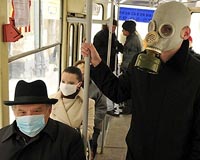| . |  |
. |
Peshawar, Pakistan (AFP) Aug 2, 2010 Fears grew Monday about outbreaks of disease among 1.5 million people affected by Pakistan's worst floods in 80 years after monsoon rains killed more than 1,200 people across the northwest. Unprecedented rains triggered floods and landslides, sweeping away thousands of homes and devastating farmland in one of Pakistan's most impoverished regions, already hard hit by years of Taliban and Al-Qaeda-linked violence. Pakistani officials warn that a lack of drinking water is spreading disease, even cholera, and saying they are working to medivac people from affected areas such as Swat, the scene last summer of a major offensive against the Taliban. Syed Zahir Ali Shah, the health minister for the northwestern province of Khyber Pakhtunkhwa, estimated that about 100,000 people, mostly children, were suffering from illness such as gastroenteritis and cholera. "In cut-off areas and parts of Swat we have sent medical teams by helicopter," he told AFP. A spokesman for the charity World Vision said teams had visited those affected around the main northwestern city of Peshawar, but that those further north had been inaccessible by road until Monday morning. "They don't have drinking water or food. They said there have been some visible signs of water-borne diseases," Muhammad Ali told AFP, warning that the death toll was likely to rise further as aid workers accessed more ground. At a camp set up by the army for around 640 families in Nowshehra, women and children ran after vehicles bringing food and water, pushing and shouting. "We are getting patients with trauma, gastroenteritis, skin diseases and dehydration," Doctor Shoaib Mohammad told AFP at a small 20-bed mobile clinic. Fifty-year-old Ajmair Shah went into shock after flood destroyed his home in Nowshehra. He lay motionless in his hospital bed and staring into the air. "My house was swept away by the flood, nothing is left there. I have lost everything," Shah said and started weeping. People at the camp said there were no proper latrines or bathrooms and that the only respite from the crushing heat was plastic hand fans. Most of them fled in the clothes they were wearing and many children roamed around naked. "They throw food at us as if we are animals and not humans," Ilyas Khan, one angry man told AFP, complaining there was no proper system of distribution. UN chief Ban Ki-moon pledged aid of up to 10 million dollars to meet the humanitarian needs of those affected by the crisis, saying he was "deeply saddened" by the floods. The US government announced a 10-million-dollar aid pledge and has rushed helicopters and boats to Pakistan. China has also promised 1.5 million dollars, according to the official Xinhua news agency. Anwer Kazmi, a spokesman for Pakistan's largest charity, the Edhi Foundation, said at least 1,256 people had been killed and that Swat was the worst affected district with 475 deaths. Khyber Pakhtunkhwa chief minister Amir Haider Hoti told reporters that the floods were "unprecedented" and warned it could take up to 10 days to assess the overall number of dead and displaced. Local government minister Bashir Ahmed Bilour put the death toll at 1,200. Pakistan's meteorological service forecast rains of up to 200 millimetres (eight inches) in the next two weeks across the northwest, Pakistani-administered Kashmir, the central province of Punjab and Sindh in the south. Television footage and photographs have shown people clinging to the walls and rooftops of damaged houses as water rushed through villages. Others have sought shelter at schools and makeshift camps. Scores of flood victims protested in Peshawar for a second day against the sluggish relief effort, shouting "give us aid sent by foreign countries" and "death to the corrupt government." Pakistan's military and the National Disaster Management Authority (NDMA) have been co-ordinating the relief effort, saying they have rescued more than 28,000 people in Khyber Pakhtunkhwa by helicopter and boat. The NDMA said nearly 30,000 homes had been damaged across the country. In addition to 1,200 people killed in the northwest, local officials said 53 people died in Pakistani Kashmir, 26 in southwestern province Baluchistan and 49 in Punjab, Pakistan's most populous province. Southern province Sindh went on red alert, spokesman Mazhar Siddiqui said, fearing that 150,000 people could be displaced by expected floods. wh-sjd-la-mak/mmg/jm/bsk
Share This Article With Planet Earth
Related Links Epidemics on Earth - Bird Flu, HIV/AIDS, Ebola
 656 swine flu deaths in Turkey: ministry
656 swine flu deaths in Turkey: ministryAnkara (AFP) July 29, 2010 Swine flu has killed 656 people in Turkey since October, the health ministry said Thursday. The death toll was given in a statement issued to deny reports that Turkey bought but did not use about 40 million doses of vaccine against the (A)H1N1 virus. "A total of 656 people, confirmed by laboratories (to have been infected), have lost their lives as of July 29, 2010," the statement said. ... read more |
|
| The content herein, unless otherwise known to be public domain, are Copyright 1995-2010 - SpaceDaily. AFP and UPI Wire Stories are copyright Agence France-Presse and United Press International. ESA Portal Reports are copyright European Space Agency. All NASA sourced material is public domain. Additional copyrights may apply in whole or part to other bona fide parties. Advertising does not imply endorsement,agreement or approval of any opinions, statements or information provided by SpaceDaily on any Web page published or hosted by SpaceDaily. Privacy Statement |